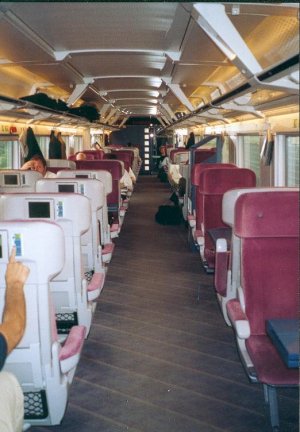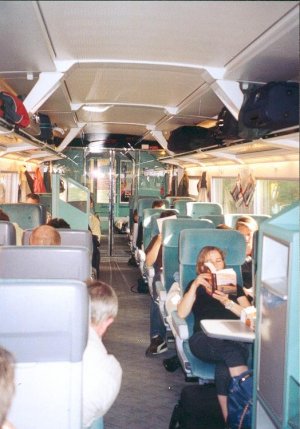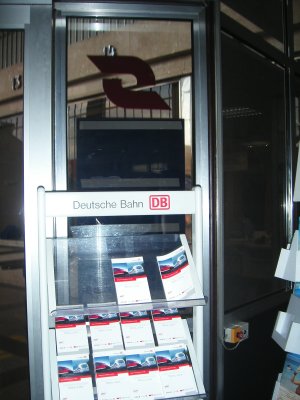Inside of the Köln-Berlin ICE (InterCity Express)
 |
 |
Mr. Frank Miram, Director of European Affairs
Ms. Elke Schaenzler, Public Relations Adviser
June 30th2004
The current situation of DB and its vision for the future are the results of an ongoing management effort that started with the Rail reform of 1994. At that time, Deutsche Bahn AktienGesellschaft was established; the German State relieved the company of its debt, unified German railways and opened the rail network for on-rail competition. In a second phase, the so called “Offensive Bahn” programme set an agenda of reorganisation cost management, product enhancement, and growth in order to become the leading international mobility and logistics service provider. To gain access to capital markets, a partial privatization of the company is being prepared. The public debate over the extent of public service obligations however, is an active and complex one, given the multiplicity of stakeholders (Länder, federal state, customers, unions).
Given the perspective of a future liberalisation of passenger transports, who would DB’s competitors be? What strategy would DB implement to maintain or increase its market share?
Today, a serious competitor for passenger transportation in Germany is low-cost airline traffic. A number of new companies have recently set up connections between major German cities and other European capitals and their offers are hard to counter. DB is working on the quality of its offer but is also asking for a level playing field in terms of taxation as current fuel tax and VAT exemptions for international flights distort competition. A journey from Berlin to Munich by train may incur up to 25 euros in taxes, which is almost the price of the airline ticket with a no frills airline.
How do you see the market for passenger transportation in the coming years?
Passenger transport should be understood as three distinct markets, which are already liberalized in Germany: regional transportation, long distance transport, up to 500 km, and very long distance transport, where rail can hardly compete with airlines. With regard to regional transport, regional authorities tender markets under PSOs (public service obligations) and private companies compete for a 10 or 12 year transport contract. Ticket prices are subsidized, since public authorities fix them and the quality of service they request. In Germany defining local transport policy is up to each Land and several competitors exist (Connex, a Veolia subsidiary for example).

For longer trips, up to 500 km, the IC and ICE trains offer fast transport, a fine degree of comfort and high frequency service. Germany has however a more complicated network than France. Indeed Paris centralises all TGV lines and so the network is star shaped and easier to coordinate. In Germany, a number of regional capitals need to be interconnected and a problem at one end of the network can snowball throughout the whole country. Thus, increasing reliability and punctuality is a key objective.
Given the challenges a rail liberalisation implies what is your opinion of the Commission’s approach?
DB supports fast rail liberalisation. Indeed, we are already faced with competition in Germany, so a broader liberalisation can only be beneficial to us. Humboldt University and IBM have published a study of the state of liberalisation in Europe, which shows great discrepancies between countries, with Germany being among the most liberalized. The second railway package which has just been adopted was a great step forward as international freight transport has a significant growth potential and represents already today an important share of our revenue. Waiting until 2010 for passenger liberalisation which is part of the third package is an unnecessary delay. Earlier opening could only benefit rail transportation as a whole.
What are your relations with other key European railway companies?

A DB commercial offering in an Austrian Railways selling point (Vienna)
We cooperate with all neighbouring countries for international transport. Even after an effective liberalisation of passenger transport, cooperation will remain necessary and useful. The main difference will be that if one of our partners cannot offer the standard of quality we offer ourselves we will be able to operate the entire line and not just the German part. We believe that the former national companies will retain a high market share in their countries of origin, but liberalisation will raise the level of productivity and service through effective competitive pressure.
Inside of the Köln-Berlin ICE (InterCity Express)
 |
 |